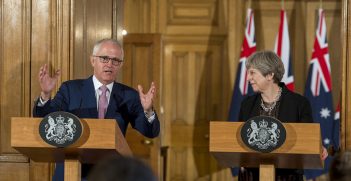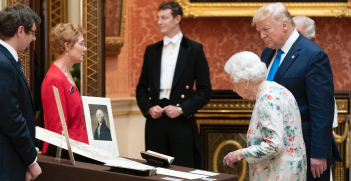Hulk Smash? Another Week of Brexit

Boris Johnson may see himself as the Incredible Hulk, but David Cameron, the EU, the Supreme Court and Liberal Democrats don’t seem to care if they make him mad.
One more week of the bruising Brexit game in British politics, and the blows from both sides have only served to escalate the tensions. Only one thing truly remains the same – Prime Minister Boris Johnson continues to insist that, “do or die,” the United Kingdom will leave the European Union on October 31; with or without a deal. He and his cohorts insist he wants to avoid a highly damaging no-deal Brexit. Both his political opponents and the European Union believe otherwise.
At the end of the week most, if not all, of the outstanding Brexit issues remain unanswered. Before re-examining these, it is necessary to recall the events of the past few days which have allowed anger among the partisans in the debate to boil over, making it even harder to unite the deeply divided country.
The first blow was struck last weekend with the serialisation of the memoir of the man who instigated the Brexit melodrama – David Cameron. Cameron resigned as UK prime minister after the 2016 referendum produced a 52-48 percent majority of Britons in favour of leaving the EU after over 45 years’ membership.
Cameron’s book, three years in the making, had been widely anticipated as a rambling exercise in self-justification for a mistaken decision that may end up causing significant harm to his country. The opposite view, of course, is that the referendum may lead to a new British golden age.
The early pickings of extracts from The Record, published in Rupert Murdoch’s The Times and the Sunday Times show, show that the book, to be published towards the end of the week, could be a humdinger. (AIIA’s Outlook will be digesting and reviewing the book).
What interested the many who have repeatedly questioned Boris Johnson’s credibility (they include former prime ministers, cabinet ministers, and editors who have employed him as a journalist) was Cameron’s account of his relationship with his fellow old Etonian before and during the referendum. Cameron writes that Johnson “did not believe in Brexit” prior to the referendum. He says he had offered Johnson a Cabinet post as defence secretary, but he chose to join the leave campaign in order to advance his political career. Cameron accuses Johnson and others in the leave campaign of declaring open warfare on him, saying they were guilty of lying to the public to win the referendum.
Cameron reserves his strongest invective for Michael Gove, a former close friend and now Johnson’s no-deal planner, who he describes as a “foam-flecked Faragist” for his claim in the referendum campaign that millions of Turks could move to the UK. (Of course, this was based on the assumption that Turkey would be admitted to the EU which, by then, was out of the question.)
The prime minister this week did himself no favours by proclaiming to the Mail on Sunday that he would approach the following day’s negotiations in Luxembourg with European Commission president Jean-Claude Junker as if he was the Incredible Hulk, “throwing off the shackles of the EU.” It was Johnson’s first negotiating session since he declared at the G7 a month ago that he would “work day and night to get a deal.” This combative approach raised eyebrows in London and drew contempt from EU officials.
The meeting with Junker – over a lunch of snails, salmon and cheese – did not go well, despite 10 Downing Street trying to put a positive spin on the talks. Junker complained that neither Johnson nor his government had come up with any serious proposals for solving the impasse caused by the EU’s insistence that the “backstop” (an insurance device to prevent a hard border within the island of Ireland and safeguarding the European Single Market) must be preserved and Johnson’s insistence that it be dropped from the Withdrawal agreement.
After the meeting between Johnson and Luxembourg’s PM Xavier Bettel things were only to get worse. Faced with the prospect of being grilled by European journalists, Johnson declined to take part in the press conference, much to the fury of Bettel. Johnson said he was unwilling to embarrass his host, knowing he would be shouted down by hostile British demonstrators who had gathered nearby. He proposed moving the press conference indoors but his hosts declined, saying that venue was too small.
Bettel could hardly contain his contempt for Johnson. Asked if he believed the absent Johnson was pursuing a sham negotiation, he replied: “Well, I told him I hear a lot but I don’t read a lot. If they want to discuss anything, we need to have it written down.”
The spat was open to different interpretation. Brexiteers and their supporters, like London’s Daily Telegraph, complained that Johnson had been treated with a lack of respect by his hosts. Opponents in Britain called him a wimp for not being prepared to face up to French and German journalists. Both are probably correct.
The third element in this week’s Brexit melodrama has been the Supreme Court hearing into two contrasting but linked appeals. In the first case Gina Miller, an ardent anti-Brexit business woman, is appealing against a London High Court decision that Johnson did not act illegally in seeking the approval of Queen Elizabeth II to prorogue Parliament for five weeks, until October 14. The second seeks to overturn last week’s decision by Scotland’s Court of Session that Johnson had acted illegally.
It is only the second time in its history that all 11 Supreme Court judges have sat together, underlining the constitutional importance of the hearing. A judgement is expected late this week or early next. Lawyers are saying it is the most important hearing since the Bill of Rights of 1629. No prime minister in recent times has taken action akin to Johnson’s. In a witness statement to the court, filed jointly with the government’s senior law officer in Scotland, he effectively warned the Supreme Court judges they should not meddle in politics. He told the country’s most senior judges they had “no jurisdiction” over his decision to prorogue Parliament, and that they risked “entering the political arena.” The statement argued that the government could suspend parliament for its own “political advantage,” Johnson has equivocated as to whether he will abide by the Supreme Court’s decision, should it go against him.
At the time of writing it would be unwise to predict an outcome. Suffice it to say, if the Supreme Court finds against Johnson he could be held in contempt of Parliament. On the other hand, a decision in favour of the Conservative government will have the effect of taking away the supreme sovereignty of Parliament and handing Power to the executive.
The other big event of the week has been the Liberal Democrat party annual conference which enthusiastically embraced the new leadership of Jo Swinson, a feisty Scot.
Most recent LDP conferences have been less than a remarkable, and maybe a little too earnest. However, fortified by a handful of new MPs who have defected from the Tories and Labour – she delighted her party by charting an ambitious new course, seeking to emulate Emmanuel Macron’s sensational election victory in France two years ago and vowing to combat a “damaging” Brexit. Ms Swinson won unanimous support for her election pledge to rescind Brexit on the day after becoming prime minister.
While the Liberal Democrats winning government is a remote possibility, the party’s momentum and the unbridled enthusiasm of its new leader will enable it to win seats from the two main parties at the forthcoming general election, especially from “remain” areas in London and other cities.
The LDP surge was probably responsible for the surprise intervention by Opposition leader Jeremy Corbyn who promised that if he became leader of a Labour government he would negotiate a new deal with the EU, which would see Britain remain in the Single Market with a customs union arrangement with the bloc. These, of course, are anathema to the Johnson government. Corbyn goes further, pledging to put any deal he negotiates to a second referendum, offering Britons the choice between that and remaining a full EU member.
So where does this leave Britain’s great divide? At the time of writing, Johnson has taken his declared hopes for a new Brexit deal to the fringes of the United Nations in New York where he has been seeking to convince President Macron of France, Chancellor Angela Merkel of Germany and outgoing European Council president Donald Tusk that he is serious about finding a solution to the Brexit impasse within the next four weeks.
Details of what he has in mind remain sketchy but appear to revolve round the idea of defining Northern Ireland as a special economic zone, to be recognised by London, Brussels and Dublin. Under this plan, there be an open border within the island of Ireland for food and agricultural products.
It seems improbable that such a solution could be quickly agreed, even were it to form the basis of a deal. Equally improbable are the quick FTA’s being canvassed by Johnson acolyte Liz Truss on her whistle-stop tour around the South Pacific.
Colin Chapman FAIIA is a writer, broadcaster and public speaker, who specialises in geopolitics, international economics, and global media issues. He is a former president of AIIA NSW and was appointed a fellow of the AIIA in 2017.





